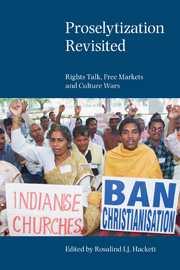Book contents
- Frontmatter
- Contents
- Preface and acknowledgements
- Contributors
- Revisiting Proselytization in the Context of Rights Talk, Free Markets and Culture Wars
- Section I
- Section II
- Section III
- Buddhism and the Politics of Conversion in Sri Lanka
- Merit and the Search for Inner Peace: the Discourses and Technologies of Dhammakaya Proselytization
- Asia's Antioch: Evangelica Christianity and Proselytism in Singapore
- False Consciousness and the Jargon of Authenticity: Religion and Nationalism in the Christianised Lowland Philippines
- Salvation through Secular Protest: the Development of Falun Gong Proselytization
- The Social and Legal Context of Proselytization in Contemporary Japanese Religions
- Section IV
- Section V
- Index
Asia's Antioch: Evangelica Christianity and Proselytism in Singapore
from Section III
- Frontmatter
- Contents
- Preface and acknowledgements
- Contributors
- Revisiting Proselytization in the Context of Rights Talk, Free Markets and Culture Wars
- Section I
- Section II
- Section III
- Buddhism and the Politics of Conversion in Sri Lanka
- Merit and the Search for Inner Peace: the Discourses and Technologies of Dhammakaya Proselytization
- Asia's Antioch: Evangelica Christianity and Proselytism in Singapore
- False Consciousness and the Jargon of Authenticity: Religion and Nationalism in the Christianised Lowland Philippines
- Salvation through Secular Protest: the Development of Falun Gong Proselytization
- The Social and Legal Context of Proselytization in Contemporary Japanese Religions
- Section IV
- Section V
- Index
Summary
Evangelical Christian leaders often remind Singaporeans that they must seek to fulfill the Great Commission to preach the gospel to all nations, observing that God has given them a special “role and responsibility in His Kingdom agenda—an Antioch for Asia” (Prayerlink 1998, 4). Antioch was a multiethnic city in what is today Turkey, and in the first century AD was the cradle of Christianity; many see Singapore as the cradle of Christianity for twenty-first century Asia. In support of their goal, Singaporean Christians provide extraordinary levels of financial support to local charitable outreach, church-planting in Singapore's so-called heartland, and global missions. Christians often observe, however, that the power to convert rests not with their own powers of persuasion but rather with the Holy Spirit and with God. Because they attribute their success to divine will, prayer seeking divine assistance is one important dimension to the practice of proselytism. Some contemporary forms of intercessory prayer also serve as an adjunct to fundraising and the support of missionary outreach, since these forms of prayer are designed to both inform and raise interest in less developed world areas.
Based on ethnographic research and interviews conducted in Singapore between 1995 and 2005, I examine the rhetoric and practice of prayers and rituals that seek stable conversion—of the non-Christian other, but also the self—as an outcome.
- Type
- Chapter
- Information
- Proselytization RevisitedRights Talk, Free Markets and Culture Wars, pp. 253 - 282Publisher: Acumen PublishingPrint publication year: 2008



